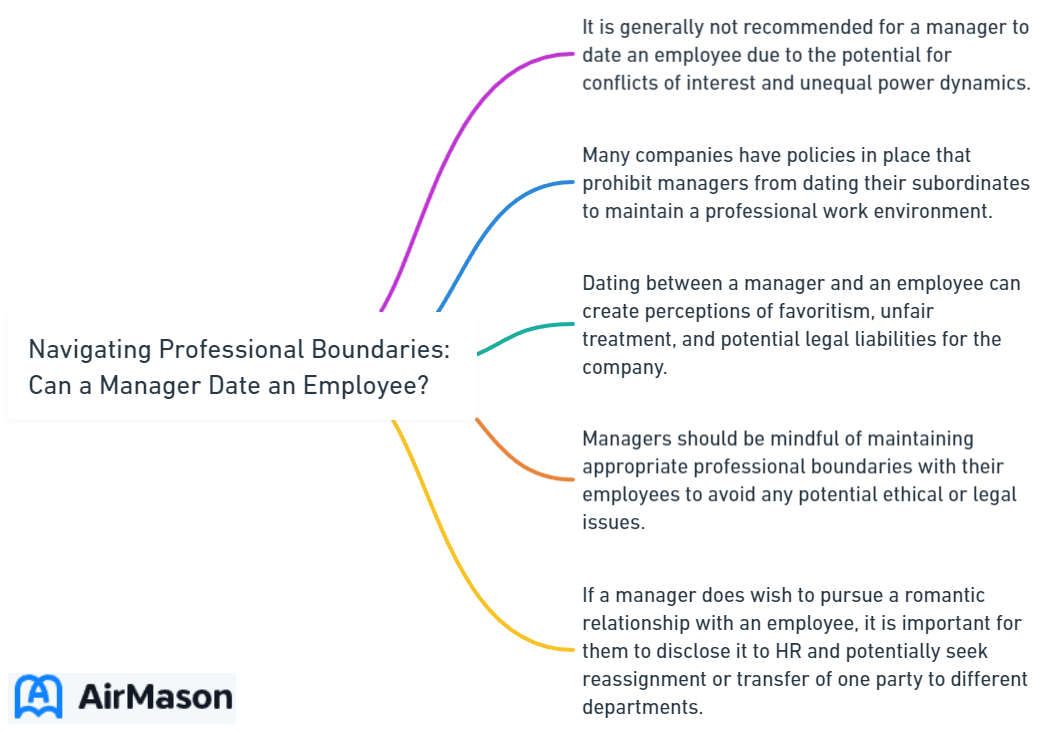
Navigating professional boundaries in the workplace is essential for maintaining a healthy and productive work environment. Establishing and respecting these boundaries is crucial for both personal well-being and professional growth. In the context of interpersonal relationships, a common question that arises is whether a manager can date an employee.
Understanding professional boundaries is the first step in answering this dilemma. Professional boundaries are the guidelines and limits set in the workplace to ensure appropriate conduct and relationships between colleagues. These boundaries are important for several reasons, including maintaining professionalism, preventing conflicts of interest, and protecting the welfare of all individuals involved.
When it comes to manager-employee relationships, the dynamics can become even more complex. While there may be different perspectives on this matter, it is essential to consider various factors before entering into such a relationship. Power dynamics and potential conflicts of interest must be carefully evaluated, as well as the presence of company policies and code of conduct that may regulate or prohibit such relationships.
Communication and consent play a crucial role in navigating manager-employee relationships. Open and transparent communication between both parties is essential to ensure that the relationship is consensual and does not compromise the professional dynamics within the workplace.
It is also important to consider the potential consequences of a manager-employee relationship. This includes evaluating the impact on the relationship itself, as well as the potential repercussions on professional growth and advancement. It is crucial to address the effect of such relationships on other colleagues and the overall team dynamics.
Managing professional boundaries in the workplace requires establishing clear policies and guidelines. Companies should provide training and education on professional boundaries to raise awareness and promote a culture of respect and professionalism. By doing so, organizations can create an environment that fosters healthy relationships while maintaining a productive work atmosphere.
Understanding Professional Boundaries in the Workplace
Professional boundaries in the workplace are essential to maintain a healthy and respectful work environment. Here are key points to understand when it comes to professional boundaries:
- Power Dynamics: Power imbalances can exist between managers and employees. Engaging in romantic or dating relationships in such situations can lead to conflicts of interest, favoritism, and compromised decision-making. It is important to consider the potential impact on the professional relationship and the overall team dynamics.
- Conflict of Interest: Romantic relationships between managers and employees can create conflicts of interest. These relationships may influence objective decision-making, fair evaluations, and equal opportunities for other employees. It can also lead to accusations of favoritism or unfair treatment.
- Perception and Trust: When a manager dates an employee, it can raise concerns among other team members about favoritism or unequal treatment. This can damage trust, morale, and overall team cohesion.
- Company Policies and Guidelines: Many organizations have policies in place that prohibit or discourage romantic relationships between managers and their direct reports. It is important to be familiar with these policies and guidelines to avoid potential conflicts and professional consequences.
- Professionalism and Objectivity: Maintaining professional boundaries helps ensure objectivity, fairness, and a focus on job performance. It is crucial to separate personal relationships from professional responsibilities to maintain professionalism and avoid compromising the integrity of the work environment.
While every situation is unique, it is generally advised to avoid romantic relationships between managers and employees to uphold professional boundaries, prevent conflicts of interest, and maintain a harmonious and productive workplace environment.
Why are Professional Boundaries Important?
Professional boundaries are crucial in the workplace for several reasons. Maintaining professional boundaries helps to establish clear roles and responsibilities within the organization, ensuring that everyone understands their professional obligations. It helps to prevent conflicts of interest and ensures that individuals focus on their job tasks and objectives, which ultimately promotes productivity and efficiency.
Professional boundaries contribute to a respectful and inclusive work environment. By adhering to these boundaries, individuals demonstrate professionalism, respect for colleagues, and an understanding of appropriate behavior. This fosters a positive workplace culture where everyone feels valued and safe.
Professional boundaries help to minimize the risk of favoritism and unfair treatment. When employees are aware of and adhere to these boundaries, it reduces the likelihood of personal biases influencing decision-making processes. This promotes fairness, equality, and equal opportunities for advancement within the organization.
Maintaining professional boundaries facilitates effective communication. It ensures that interactions are focused on work-related matters, allowing for clear and concise conversations. By separating personal relationships from professional ones, misunderstandings and conflicts are less likely to occur.
Professional boundaries are important in the workplace because they establish clear roles, promote a respectful environment, minimize biases, and facilitate effective communication. By understanding and respecting these boundaries, individuals can contribute to a positive and successful work environment.
Pro-tip: It’s crucial to regularly review and update company policies and guidelines on professional boundaries to ensure they align with changing work dynamics and societal expectations.
What Defines a Professional Relationship?
A professional relationship is defined by certain characteristics and boundaries that distinguish it from personal or casual relationships in the workplace. These boundaries ensure that both parties maintain a level of professionalism and respect while working together.
1. Role-based Interactions: A professional relationship is based on the roles and responsibilities each person has within the organization. Interactions should focus on work-related matters and the achievement of common goals.
2. Clear Communication: Communication in a professional relationship should be clear, concise, and focused on work-related topics. It should be respectful and avoid personal or inappropriate discussions.
3. Mutual Respect: Professional relationships require mutual respect between individuals. Respecting each other’s ideas, opinions, and differences is important for maintaining a positive and productive working environment.
4. Boundaries: Professional relationships have clear boundaries that define the scope of the relationship. These boundaries help prevent conflicts of interest, favoritism, or inappropriate behavior.
5. Confidentiality: Maintaining confidentiality is crucial in a professional relationship. Personal and sensitive information shared in the course of work should be kept confidential and not shared with others without proper authorization.
6. Accountability: Professional relationships entail being accountable for one’s actions and responsibilities. Holding oneself and others accountable fosters trust and ensures that work is completed efficiently and effectively.
7. Professional Courtesy: Professional relationships should be characterized by politeness, courtesy, and professionalism. Treating others with kindness and respect sets a positive tone for the workplace.
It is important to be aware of these factors when navigating professional relationships to promote a healthy and productive work environment. By understanding and respecting these boundaries, individuals can foster positive working relationships that encourage collaboration and success.

The Dilemma: Can a Manager Date an Employee?
Is it ever appropriate for a manager to date an employee? That’s the question we tackle in this section. We’ll dive into the complex dynamics and ethical considerations surrounding this dilemma. From exploring different perspectives to examining the potential ramifications, we’ll uncover the nuances and implications of romance within the workplace. Get ready for a thought-provoking examination of the blurred lines between personal and professional relationships.
Exploring Different Perspectives
In order to gain a comprehensive understanding of the dilemma of managers dating employees, it is crucial to explore different perspectives. This enables us to carefully consider multiple viewpoints and make informed decisions.
One important perspective to consider is that of the employees. They may feel a sense of discomfort or inequality in the workplace when they witness a manager dating a subordinate. This can lead to feelings of favoritism, unfair treatment, or a compromised work environment. Furthermore, employees may also perceive that the manager is abusing their power dynamic, potentially resulting in a decrease in morale or productivity.
From the manager’s point of view, they may argue that they should have the right to pursue personal relationships outside of work, and that their personal life should not interfere with their professional responsibilities. They may firmly believe that as long as they maintain open and transparent communication about the relationship, it will not impact their professional judgment or create conflicts of interest.
Another crucial perspective to consider is that of the company. Companies often have policies and codes of conduct in place that explicitly prohibit relationships between managers and subordinates. This is due to the potential for biased decision-making, conflicts of interest, or negative impacts on team dynamics. The company may prioritize maintaining a fair and professional work environment.
It is of utmost importance to consider all these perspectives and carefully weigh the potential consequences before making any decisions. Ultimately, the views of all stakeholders should be taken into account in order to strike the right balance between personal relationships and professional boundaries in the workplace.

Factors to Consider Before Entering a Relationship
Before you decide to pursue a romantic relationship with a coworker, it’s crucial to consider a few important factors. From power dynamics and conflicts of interest, to company policies and the impact on team dynamics, each sub-section will shed light on specific aspects that can influence your decision. So, let’s dive into these factors and explore the complexities of navigating professional boundaries when it comes to dating a colleague.
Power Dynamics and Potential Conflicts of Interest
In exploring the possibility of a manager dating an employee, it is important to consider the power dynamics and potential conflicts of interest. These factors play a significant role due to the inherent hierarchical structure within a workplace, impacting the professional relationship.
1. Unequal power dynamics: The authority held by managers and their ability to influence or make decisions affecting employees create an imbalance of power. This can create pressure on the employee to comply with the manager’s wishes, leading to favoritism, unfair treatment, and conflicts among colleagues, which can harm team morale.
2. Conflicts of interest: When a manager is romantically involved with an employee, conflicts of interest can arise. The manager may provide preferential treatment, opportunities, or promotions to their partner, resulting in a perception of bias or unfair advantages. Such actions undermine the trust and integrity of the organization and generate dissatisfaction among other employees.
To address these potential issues, organizations must establish clear policies and guidelines regarding workplace relationships. These policies should cover power imbalances, conflicts of interest, and the appropriate steps to be taken if a romantic relationship develops between a manager and an employee.
Both managers and employees should receive training and education on professional boundaries, fostering a workplace culture of professionalism, respect, and equality. Encouraging open and transparent communication is also crucial to ensure all parties are aware of the potential consequences and implications of their actions.
Considering power dynamics and potential conflicts of interest allows organizations to prevent harm, maintain a fair and unbiased work environment, and preserve professionalism and integrity.
Company Policies and Code of Conduct
When it comes to considering the rules and regulations for employees in company regarding dating relationships between managers and employees, it is important to remember the key factors related to these guidelines:
- Clarity and specificity: Company policies and code of conduct should explicitly outline the expectations and guidelines surrounding romantic relationships in the workplace. It is crucial to clearly state whether relationships between managers and employees are allowed or prohibited, and under what circumstances.
- Fairness and equality: Company policies need to be fair and treat all employees equally. They should prohibit favoritism, conflicts of interest, or any abuse of power. These measures ensure a level playing field for all employees and protect against any perceived or actual misconduct.
- Consent and disclosure: It is essential for policies to emphasize the importance of obtaining explicit consent from both parties involved in the relationship. Employees should disclose their relationship to management or HR to prevent any potential conflicts of interest and ensure transparency.
- Impact on professional dynamics: Company policies should address the potential impact of these relationships on team dynamics, employee morale, and productivity. It is crucial to consider any disruptions or biases that may arise from such relationships and have mechanisms in place to address them.
- Enforcement and consequences: These policies should clearly outline the consequences for violating the company’s rules and regulations regarding workplace relationships. It is important that these consequences be fair, consistent, and proportionate to the severity of the violation.
By considering these factors, companies can establish clear and effective company policies and code of conduct regarding dating relationships between managers and employees. This helps create a respectful and professional work environment while minimizing potential conflicts and issues related to power dynamics.
Impact on Team Dynamics
- The impact on team dynamics arises when a manager dates an employee. This can result in a shift in power dynamics within the team, potentially leading to favoritism, perceived bias, or unfair treatment towards other team members.
- One of the consequences is decreased team morale. The relationship between a manager and an employee can have a negative impact on team morale, as other members may feel uncomfortable or excluded. This can cause a decline in overall team cohesion and productivity.
- Lack of transparency and trust can also be a consequence. The presence of a romantic relationship between a manager and an employee can undermine transparency and trust within the team. Other team members may question the manager’s objectivity and decision-making abilities, ultimately impacting the overall work environment.
- Furthermore, possible conflicts of interest can arise from manager-employee relationships. This can result in decisions being made based on personal rather than professional considerations, compromising team objectives and organizational goals.
- Another concern is the perception of favoritism. Team members may perceive that the employee involved in a relationship with the manager receives preferential treatment, creating a sense of unfairness. This perception can erode trust and negatively affect the team’s motivation and performance.
- Finally, the dynamics of a romantic relationship within a team can disrupt teamwork. Personal issues or conflicts between the manager and employee may spill over into the work environment, causing tension and adversely affecting the overall effectiveness of the team.

The Role of Communication and Consent
When it comes to navigating the delicate territory of professional boundaries, the role of communication and consent is paramount. In this section, we’ll explore the importance of open and transparent communication as well as the significance of ensuring consensual relationships. These sub-sections shed light on the critical elements that contribute to maintaining a healthy and ethical dynamic between managers and employees. So, let’s dive deeper into the key factors that play a crucial role in this complex professional landscape.
Open and Transparent Communication
Open and transparent communication is the key to navigating professional boundaries in the workplace. It is crucial for fostering trust, understanding, and respect among colleagues and for preventing misunderstandings or conflicts that may arise from blurred lines between personal and professional relationships.
By actively promoting open and transparent communication, individuals can openly discuss their concerns, expectations, and boundaries with each other. This allows everyone involved to have a clear understanding of what is acceptable and appropriate in their professional interactions.
In the case of a manager dating an employee, open and transparent communication becomes even more vital. Both parties should openly communicate their intentions, ensuring that both are fully consensual and on the same page regarding the relationship. These discussions should also include considerations of the potential impact on workplace dynamics and the possible perception of favoritism or bias.
Open and transparent communication should not be limited to just the individuals involved; it should extend to informing other colleagues and superiors about the relationship. This transparency helps to avoid any conflicts of interest or potential issues with power dynamics, promoting fairness and integrity within the organization.
In a real-life example, open and transparent communication played a significant role in resolving a conflict between two colleagues. They openly discussed their grievances and concerns, leading to a solution that satisfied both parties and improved their working relationship. This incident highlighted the true importance of open and transparent communication in maintaining a harmonious and productive work environment.
Ensuring Consensual Relationships
Ensuring consensual relationships is crucial when navigating professional boundaries in the workplace. Here are some key factors to consider:
- Clear communication: Open and transparent communication is essential to establish mutual consent in any relationship. Ensure that both parties involved freely express their desires, boundaries, and expectations.
- Understanding power dynamics: Recognize and assess any power imbalance that may exist between individuals. Power differentials can create an environment where consent may be compromised. It is important to address and mitigate any potential conflicts of interest.
- Respecting company policies: Familiarize yourself with your organization’s policies and code of conduct regarding personal relationships in the workplace. Adhering to these guidelines will help maintain professionalism and prevent conflicts of interest.
- Considering the impact on team dynamics: Evaluate how a romantic relationship between a manager and an employee may affect the dynamics within the team. It is crucial to ensure fairness, equality, and maintain a harmonious work environment.
Pro-tip: It is advisable to consult with HR or a supervisor when navigating relationships in the workplace. They can provide guidance, clarify any potential conflicts, and ensure that all parties involved are aware of and consent to the relationship.

Navigating the Potential Consequences
When it comes to an interoffice romance between a manager and an employee, it’s important to navigate the potential consequences before getting swept up in emotions. In this section, we’ll dive into the various ramifications that such a relationship can have. From the impact on the relationship itself, to the potential repercussions on professional growth and advancement, and even addressing how it affects other colleagues – we’ll explore the complexities and challenges that arise when professional boundaries blur. Let’s unpack the minefield of manager-employee dating.
Possible Ramifications for the Relationship
Entering into a romantic relationship between a manager and an employee can potentially lead to several ramifications for their professional relationship.
1. Conflict of interest: This kind of relationship can create a conflict of interest since the manager is responsible for evaluating the employee’s performance and making career-impacting decisions. This can give rise to concerns about fairness and favoritism.
2. Power dynamics: The dynamics of power within the professional relationship can become imbalanced when a romantic relationship is involved. The employee may feel compelled to comply with the manager’s requests or decisions due to the personal nature of their relationship, resulting in an uneven distribution of power.
3. Impact on other colleagues: The relationship has the potential to generate tension and dissatisfaction among other colleagues who may perceive unfair treatment or a lack of professionalism. It can also affect team dynamics and collaboration if there are concerns about bias or favoritism.
4. Reputational damage: The relationship may damage trust and credibility within the organization. Colleagues and superiors may question the manager’s decision-making abilities, believing they are compromised, which can harm their professional reputation.
To mitigate these potential ramifications, it is crucial for organizations to establish clear store policy for employees concerning workplace relationships. Open and transparent communication is also essential, ensuring that all parties involved fully understand the possible consequences and are willing to handle them responsibly.
Pro-tip: It is recommended for managers to maintain professional boundaries and avoid entering into romantic relationships with their employees in order to uphold fairness, prevent conflicts, and sustain a positive work environment.
Repercussions on Professional Growth and Advancement
The consequences on professional development and progression can be substantial when a manager engages in a romantic relationship with an employee within the same organization.
1. Limited career opportunities: Being involved in a romantic relationship with a subordinate can create a perception of favoritism and prejudice, which can impede their professional growth. Colleagues may perceive their promotions or opportunities as undeserved, impacting their credibility and future prospects.
2. Damaged professional reputation: When a manager dates an employee, it can compromise their professional reputation. Other colleagues may question their ethical integrity and professionalism, leading to a loss of trust and respect from both superiors and subordinates.
3. Increased conflicts and tensions: Dating a subordinate can lead to conflicts of interest and favoritism, creating a tense working environment. This can negatively impact teamwork, collaboration, and overall productivity, affecting not only the individuals involved but also the entire team.
4. Legal implications: In some cases, dating a subordinate may violate company policies, codes of conduct, or even local laws. This can result in disciplinary actions, legal consequences, or damage to a manager’s professional standing.
To navigate these potential consequences, it is important for organizations to establish clear policies and guidelines regarding relationships in the workplace. Providing training and education on professional boundaries helps employees understand the implications of such relationships and encourages them to make responsible choices. Open and transparent communication is also crucial to ensure all parties involved are consenting and aware of the potential consequences.
While a manager dating an employee may seem like a personal choice, it can have significant repercussions on professional development and progression. It is essential for individuals and organizations to consider these consequences and make informed decisions to maintain professionalism and create a conducive work environment.
Addressing the Impact on Other Colleagues
When a manager dates an employee, addressing the impact on other colleagues is crucial for maintaining a healthy work environment and ensuring fairness among all team members. Here are some important considerations to keep in mind:
- Distractions and Favoritism: When a manager becomes involved with an employee, it can create distractions and favoritism within the team. Other colleagues may feel neglected or unfairly treated, leading to decreased morale and productivity.
- Perception of Bias: Even if the manager remains impartial in decision-making, addressing the impact on other colleagues is important. The perception of bias can negatively impact the team dynamics. Colleagues may question the manager’s objectivity and the fairness of their actions, leading to a breakdown in trust and collaboration.
- Resentment and Jealousy: Addressing the impact on other colleagues is crucial when a manager dates an employee. Colleagues may feel resentful or jealous of the special treatment or opportunities that the involved employee receives. This can lead to feelings of frustration and can harm interpersonal relationships within the team.
- Decreased Communication and Transparency: The presence of a romantic relationship between a manager and an employee may create barriers to open communication and transparency. Addressing the impact on other colleagues is necessary to prevent this. Colleagues may hesitate to express their opinions or concerns, fearing potential consequences or favoritism.
- Negative Organizational Culture: If the impact of the manager-employee relationship on other colleagues is not addressed, it can contribute to a negative organizational culture. This can lead to increased turnover, decreased employee satisfaction, and may even tarnish the company’s reputation.
Addressing the impact on other colleagues requires clear policies and guidelines that prohibit or manage relationships between managers and subordinates. It is essential to promote a fair and inclusive work environment where all employees feel valued and respected based on their skills and contributions rather than personal relationships. By doing so, organizations can create a supportive and productive workplace for everyone.
Fact: According to a study conducted by the Society for Human Resource Management (SHRM), around 27% of organizations prohibit romantic relationships between supervisors and subordinates to mitigate the impact on other colleagues and maintain a professional work environment.
Managing Professional Boundaries in the Workplace
Navigating professional boundaries is a crucial aspect of maintaining a healthy and harmonious workplace. In this section, we’ll explore effective strategies for managing professional boundaries within the workplace. From establishing clear policies and guidelines to providing training and education on this subject, we’ll uncover practical approaches that help foster a professional environment. So, let’s dive in and discover how to navigate the complex dynamics and ensure a respectful and productive professional relationship between managers and employees.
Establishing Clear Policies and Guidelines
When it comes to navigating professional boundaries in the workplace, it is imperative for organizations to establish clear policies and guidelines to ensure that employees understand the expectations and limitations.
- Establishing clear policies and guidelines: Organizations should have well-defined policies in place that outline the acceptable and unacceptable behaviors regarding relationships between managers and employees. These policies should be easily accessible and communicated to all employees.
- Consistency: It is important for policies and guidelines to be applied consistently across the organization to avoid any confusion or favoritism. This helps create a fair and transparent working environment for everyone.
- Address power dynamics: Clear policies should address power dynamics and potential conflicts of interest that may arise in relationships between managers and employees. By acknowledging these dynamics, organizations can take preventative measures to minimize any negative impact.
- Consequences: Organizations should also establish clear consequences for violating the policies regarding manager-employee relationships. This may include disciplinary actions or even termination, depending on the severity of the violation.
- Regular training and education: Providing training and education on professional boundaries is essential to ensure that all employees understand the policies and guidelines. This can help prevent any misunderstandings and promote a professional work environment.
A true story that highlights the importance of establishing clear policies and guidelines in the workplace involves a manager who entered into a romantic relationship with one of their subordinates without any organization-wide policies in place. This led to conflicts of interest and uncomfortable situations within the team. Eventually, the organization had to implement clear policies to prevent such situations from arising in the future and to maintain a professional work environment for all employees.
Providing Training and Education on Professional Boundaries
Comprehensive training and education on professional boundaries are vital for maintaining a healthy and respectful workplace environment. The following are key considerations when implementing such programs:
- Active engagement: To ensure a comprehensive understanding of professional boundaries, employers should actively engage employees in training sessions. This can be accomplished through interactive workshops, role-playing exercises, and case studies.
- Factual assertions: Instead of relying on modal verbs, the training should focus on factual assertions. For example, instead of saying “employees must respect boundaries,” the training can emphasize the importance of respecting boundaries for maintaining professional relationships.
- Relevance: To ensure effectiveness, training on professional boundaries should directly relate to the workplace context. It should address specific scenarios that employees may encounter in their roles and provide practical guidance on how to navigate them.
- Quantitative descriptors: When discussing the impact of violating professional boundaries, it is crucial to provide quantitative details. For instance, instead of saying “it can lead to negative consequences,” the training can emphasize that a breach of boundaries can result in disciplinary action or even termination.
- Plural nouns: Using plural nouns acknowledges that professional boundaries are relevant to all employees, regardless of their position within the organization. This promotes a culture of mutual respect and accountability.
- Consistent sentence structure: Each point in the training should be delivered consistently, starting each sentence with the same part of speech for clarity and coherence.
- Mirroring the prompt: The training should address the importance of providing training and education on professional boundaries. It should focus on equipping employees with the knowledge and skills necessary to maintain appropriate workplace relationships.
- Conditions following assertions: When discussing the potential consequences of breaching professional boundaries, it is important to highlight that disciplinary action will be taken when necessary, regardless of the employee’s position or tenure.
By implementing comprehensive training and education on professional boundaries, organizations can foster a culture of respect, professionalism, and mutual understanding among employees.
Frequently Asked Questions
Can a manager date an employee?
Yes, a manager can date an employee, but it is important to navigate this situation carefully to maintain a professional and respectful workplace environment.
What are the risks of a manager dating an employee?
The risks of a manager dating an employee include conflicts of interest, potential favoritism, and damage to the manager’s professional reputation. It is important to consider these risks before pursuing a romantic relationship.
What guidelines should be followed regarding office romances?
It is important to establish clear guidelines regarding office romances, such as reporting relationships to HR, prohibiting relationships between supervisors and subordinates, and setting boundaries for physical displays of affection on company property.
How can power dynamics impact consent in office relationships?
Power dynamics in office relationships can impact consent, as an employee may feel pressured to engage in a relationship with a manager due to the power imbalance. It is crucial to ensure that all relationships are consensual and free from coercion or abuse.
What role does HR play in navigating office romances?
HR can provide valuable guidance and support when navigating office romances. They can help establish policies, provide training on power dynamics, and serve as a neutral third party to address any conflicts or issues that may arise.
What are some best practices for handling office romances as a manager?
As a manager, it is important to lead by example, foster a safe working environment, and strictly prohibit relationships between supervisors and subordinates. It is also crucial to consult HR, establish clear expectations, and enforce workplace policies regarding office romances.
